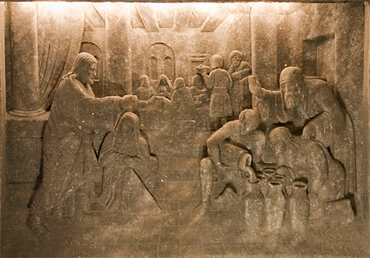Explanation of John 2:4
작가: Brian David

This is a strange-sounding verse, as Jesus seems to address his own mother roughly and a bit dismissively. It also sounds like he is brushing off the lack of wine as someone else's problem. Both impressions are apparently misleading, though, even in the literal meaning of the story. Mary must not have been put off; she immediately instructed the servants to do whatever Jesus told them to. And rather than shrugging at the lack of wine, Jesus immediately set about performing his first miracle.
Whatever the case, the spiritual meaning offers something much deeper.
The wedding in Cana represents a good, receptive church among the Gentiles. The lack of wine means that the church lacks a true understanding of spiritual things. Jesus represents the Lord's divine goodness, and his mother – representing the Lord's true church on earth – has noted the lack.
But the identity of the Lord's true church is changing; the Lord was born as Jesus to bring an end to the Jewish church in that role and launch the Christian church. "Woman" simply represents a church; when Jesus calls her that it indicates that in a spiritual sense He has no mother church. He is there to start a new mother church.
"Hour" represents a spiritual state, and to "come" means a joining of spiritual states. So when Jesus says "mine hour is not yet come," it means that His spiritual state has not yet been introduced to the church among the Gentiles.
Altogether, then, this verse represents a transition point. The Lord has been using the Jewish church for some 2,000 years to preserve spiritual meanings, even though the people in the church didn't know it and weren't particularly spiritual. But the time has come for change. The new church has not yet begun – it has no wine – but the Jewish church has lost its place – it is no longer "mother," but simply "woman."
Arcana Coelestia #6397
6397. 'Will judge his people, as one of the tribes of Israel' means that it is one of the truths in general which the tribes of Israel represent. This is clear from the meaning of 'judging' as truth exercising its proper function, dealt with below; from the meaning of 'people' as those governed by truth, dealt with in 1259, 1260, 2928, 3295, 3581, 4619, at this point those guided by truth but not as yet by good, since they are Dan, that is, the people of Dan, 6396; and from the representation of 'the tribes of Israel' as all truths and forms of good in general, dealt with in 3858, 3926, 3939, 4060, 6335. Consequently 'will judge his people, as one of the tribes of Israel' means that the truth which 'Dan' represents is one of the general truths that 'the tribes of Israel' represent. The reason why 'judging his people' means truth exercising its proper function is that all truths in general are represented by 'the tribes of Israel', as may become clear from the paragraphs referred to above; and since truths are what act as judges, 'judging his people' means truth exercising its proper function.
[2] In the Word one reads the description that the twenty-four elders will sit on thrones and judge nations and peoples, and that the twelve apostles will similarly sit on thrones and judge the twelve tribes of Israel. A person with no knowledge of the internal sense of the Word will think that precisely that is going to happen. But how those descriptions should be understood becomes clear when one knows from the internal sense what 'the twenty-four elders', 'the twelve apostles', and also 'thrones' mean, namely all truths in their entirety, in accordance with which judgement is effected. The same goes for one's understanding here of 'judging his people as one of the tribes of Israel'. The meaning is not that these or any other elders among them will act as judges, but that the actual truths meant by them, therefore the Lord alone since every truth comes forth from Him, will do so. The reference to the twenty-four elders who will sit on thrones and act as judges occurs in John as follows,
Around the throne were twenty-four thrones, and on the thrones I saw twenty-four elders seated, clad in white garments, who had crowns of gold on their heads. Revelation 4:4; 11:16.
In the same book,
I saw thrones, and they sat on them, and judgement was given to them. Revelation 20:4.
The reference to the twelve apostles occurs in Matthew,
Jesus said, You who have followed Me, in the regeneration, when the Son of Man sits on the throne of His glory, will also sit on twelve thrones, judging the twelve tribes of Israel. Matthew 19:28.
And in Luke,
I bestow on you, just as My father bestowed on Me, a kingdom, that you may eat and drink at My table in My kingdom, and sit on thrones, judging the twelve tribes of Israel. Luke 21:29-30.
Here neither the twenty-four elders nor the twelve apostles are what are really meant but all truths and forms of good in general, as may be recognized from the consideration that nobody, not even any angel, can judge anyone; for no one except the Lord alone can know what a person is or ever will be like interiorly. With regard to the twelve apostles, that they had a similar meaning to the twelve tribes, which was all truths and forms of good in their entirety, see 2129, 2553, 3488, 3858 (end). From all this it is now evident that 'Dan will judge his people, as one of the tribes of Israel' means that the truth represented by 'Dan' is one of the general truths by means of which judgement is effected.






